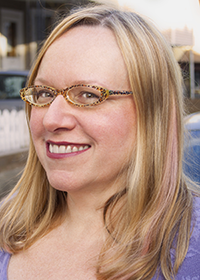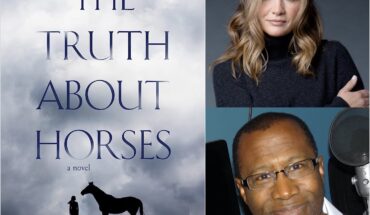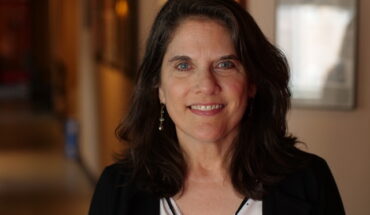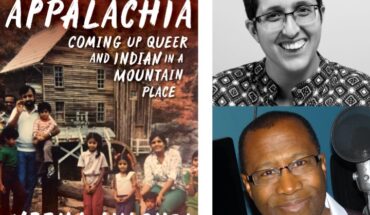 If you’ve taken a novel-related class at Boston’s Grub Street, it’s likely you’ve crossed paths with Lisa Borders. Author of The Fifty-First State and Cloud Cuckoo Land, Lisa developed Grub Street’s Novel in Progress classes, founded the Novel Generator, and co-founded the Novel Incubator. Through her lightning-quick insights (seriously, the way she can read 10 pages while simultaneously formulating on-point feedback blows my mind) and never-ending warmth and support, she’s helped birth and shape countless novels over the years. I’m pretty sure Lisa will one day hold the record for number of mentions in book acknowledgements.
If you’ve taken a novel-related class at Boston’s Grub Street, it’s likely you’ve crossed paths with Lisa Borders. Author of The Fifty-First State and Cloud Cuckoo Land, Lisa developed Grub Street’s Novel in Progress classes, founded the Novel Generator, and co-founded the Novel Incubator. Through her lightning-quick insights (seriously, the way she can read 10 pages while simultaneously formulating on-point feedback blows my mind) and never-ending warmth and support, she’s helped birth and shape countless novels over the years. I’m pretty sure Lisa will one day hold the record for number of mentions in book acknowledgements.
To the great loss of aspiring novelists everywhere, Lisa recently announced that she’s stepping down from teaching the Generator in order to devote more time to her own writing. In an attempt to bottle up some of her wisdom for writers who won’t be lucky enough to learn from her, I recently picked her brain about the novel-writing process. Bookmark this interview or have your note-taking apparatus handy, because you’ll want to come back to her spot-on thoughts again and again.
What is a common stumbling block that you find your students run into when writing a first draft of a novel? What is your advice for overcoming it?
I think the biggest stumbling blocks are often process related rather than craft related. Writers put so much pressure on themselves; and I think at GrubStreet, where many students have wanted to write a novel for years before taking a class, the desire for it to come out perfect on the first try looms large. You and I both know that first drafts are never perfect, and in fact, often bear no resemblance to the final work; but many writers get frustrated by their inability to get it immediately right, and then a sort of panic sets in. This panic often amplifies whatever insecurities about writing the writer already has – and who among us doesn’t have those insecurities? I’ve seen this kind of panic lead to procrastination, writer’s block, or worse – sometimes writers just want to trash the book and start a new one. I once had a student who told me she’d started five different novels and abandoned each around the 50-page mark, when that panic set in.
There are times, of course, that giving up on a novel can be a good decision. I gave up on two I started between The Fifty-First State and my current novel, one because I decided it needed to be a novella and didn’t have the scope of a novel; one because I just couldn’t get the voice working. But often, writers give up prematurely, often at the point where thinking about the shape of the story becomes essential and the writing flows less easily.
The advice is, of course, to push through. Try to identify the source of your writer’s block, or desire to abandon the book. If the block is because you don’t know what needs to happen next, sketch an outline. If it’s because you’ve lost confidence, give yourself permission for the draft to be bad – messy, cliché-ridden, weak. Just get the story on the page and know that you will go back to it, repeatedly, and make the writing better. If you want to give up on the project entirely, identify whether this is a pattern, and get trusted readers to tell you whether they think it’s a book worth pursuing.
What is a common misconception students have about the process of writing a novel when they start the Novel Generator program, and how do you help them work through this misconception?
I think emerging writers sometimes underestimate the amount of work that goes into a novel. They are prepared to work on their first draft for a year, but then hope that it will only need a polish after that and be ready to start sending out to agents. The truth is that most books go through 5 – 7 drafts – sometimes more! – and your second draft may look nothing like your first draft. Sometimes when faced with the realization of how much work it is, I see a kind of horror in the writer’s eyes: “What have I gotten myself into?”
When someone finishes a first draft, what are the next immediate steps they should take?
First of all, they should do a happy dance. I’m not kidding. The first draft of my first novel took me about eight years, and I remember the computer I was using (a Ruby Red iMac!), the desk where I was sitting, the room, the way I felt. Until that point, I hadn’t been entirely sure I could finish a draft of a novel. Finishing a first draft is huge, and deserves celebration.
But after that, here’s what I would recommend. First, print it out and put it in a drawer for a month. Really take some time away from it to be able to look at it again with fresh eyes. Then take the copy out and read it with a critical eye. See if you can identify on your own those issues that need to be fixed. If you can, go through and make those changes.
After that – or if you can’t figure out what’s working and what’s not working – you need readers. These may come in a classroom setting, a writing group, or through a manuscript consultation. Ideally, your readers should be other writers, though I have always had at least one smart non-writer (but avid reader) give me feedback on each of my books. You may need several rounds of readers for each draft as you work through different craft elements.
After the book has been through numerous drafts, and/or after your last round of readers all say they think it’s done – then and only then should you start querying agents.
Have you learned anything from watching your students work through their first drafts that you can apply to your own writing? If so, what?
I think it’s an unspoken secret among writing teachers that we all learn a ton from our students! My greatest weakness in early drafts is a tendency to frontload the novel with too much backstory. This is something many of my students struggle with as well. When you’re reading someone else’s draft, it’s easy to see how all that backstory isn’t especially interesting, but it can be tough for a writer to see in her own work. Occasionally I will catch myself trying to justify a backstory dump in a first chapter of an early draft of mine, and I’ll ask myself: if one of my students did this, would I think it worked? The answer is almost always “no.”
What’s one piece of writing advice you now pass on to your students that you wish you would have known before starting your first novel?
I wish I’d understood the importance of structure and plot. If I had, I don’t think it would have taken me as long as it did to write my first book. It’s the least fun, least sexy part of the writing process – but it will sink your novel if you don’t figure it out.
If a writer is going to read one book on writing technique, which one would you suggest?
That’s hard! I have so many go-to books. Purely for craft, I recommend “The Art of …” series by Graywolf Press, as well as Adam Sexton’s Master Class in Fiction Writing. For a broader perspective on writing and the writing life, I’d recommend Robin Black’s Crash Course. I’m also fond of John Gardner’s The Art of Fiction and On Becoming a Novelist, which I first read in the early 1990s. I don’t agree with everything Gardner says – he can be really cranky! – but I think he offers up some smart observations about how fiction works.
Now that you’re done with the Generator, what’s next for you? How can writers still benefit from your wisdom, and what’s next for your writing?
For now, I’m trying to finish my own first draft of novel #3, which I hope will be done by the end of this year. I will be available to my former Grub students (and other writers) for manuscript consultations and coaching, and in fact, will have more time for that now that I won’t be running the Generator. And I’ll continue to teach in the University of Arkansas at Monticello’s online MFA program.
It’s still not quite real to me that my current students will be my last in the Generator program – though leaving is a bit easier knowing that the program will be in the very capable hands of Annie Hartnett. It has been such a privilege to create the Generator and help six classes of novelists to write their first drafts, and I’m grateful to GrubStreet for that opportunity.




11 comments